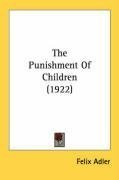Adler Felix
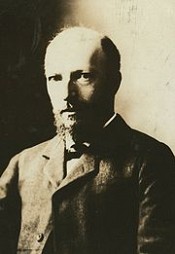
Felix Adler (August 13, 1851 – April 24, 1933) was a Jewish rationalist intellectual, popular lecturer, religious leader and social reformer who founded the Ethical Culture movement and is thought to have been a main influence on modern Humanistic Judaism. He was born in Alzey, Germany, the son of a rabbi, Samuel Adler. The family immigrated to the United States from Germany when Felix was six years of age on the occasion of his father's receiving an appointment as head rabbi at Temple Emanu-El in New York. Felix Adler graduated from Columbia University in 1870 and moved to Germany where he received a doctorate from Heidelberg University. Starting in 1874 he spent two years at Cornell University in the Department of History as Professor of Oriental Languages and Hebrew before his "dangerous attitude" caused him to leave. He returned to New York and preached some sermons at the Temple Emanu-El in New York City where his father was still the head rabbi. He was noted for omitting reference to God in any of his Sermons, an unorthodox approach which made him suspect by many in the New York Jewish community and ended any thought of him succeeding his father. Then, at the age of twenty-four, Adler founded the New York Society for Ethical Culture in 1876. His sermon on May 15, 1876 is considered to be the date on which the religion he called Ethical Culture was established. His lectures before this society on Sundays in New York were well known and attended, and were routinely reported on in the New York Times. Adler's belief in deed rather than creed led his society to foster two innovative projects. In 1877 the NYSEC sponsored Visiting Nursing, where nurses, and doctors if necessary, visited the homebound sick in poor districts. This service was eventually incorporated into the New York City health system. A year later, in 1878, a Free Kindergarten was established as a tuition-free school for working people's children. It evolved over time into the Ethical Culture Fieldston School. In 1902 Adler was given the chair of political and social ethics at Columbia University, which he held until his death in 1933. Well known as a lecturer and writer, Adler served as rector for the Ethical Culture School until his death in 1933. Throughout his life he always looked beyond the immediate concerns of family, labor, and race to the long-term challenge of reconstructing institutions like schools and government to promote greater justice in human relations. Within Adler's ethical philosophy, cooperation rather than competition remained the higher social value. Adler became the founding chairman of the National Child Labor Committee in 1904. Lewis Hine became the committee's photographer in 1908. In 1917 Adler served on the Civil Liberties Bureau, which later became the American Civil Liberties Bureau and then the American Civil Liberties Union (ACLU). In 1928 Adler became president of the Eastern division of the American Philosophical Association. Adler served on the first Executive Board of the National Urban League. As a member of the New York State Tenement House Commission, Adler was concerned not only with overcrowding but also by the increase in contagious disease caused by overcrowding. Though not a proponent of free public housing, Adler spoke out about tenant reform and the rents which he considered exorbitant. Jacob Riis wrote that Adler had "clear incisive questions that went through all subterfuges to the root of things." In 1885 Adler and others created the Tenement House Building Company in order to build "model" tenements that rented for $8–$14/month. By 1887 six model buildings had actually been erected on the Lower East Side of Manhattan for the sum of $155,000. Even though critics favored restrictive legislation for improving tenement living, the model tenement was a progressive step forward. By the late 1890s, with the increase in international conflicts, Adler switched his concern from domestic issues to the question of American foreign policy. While some contemporaries viewed the 1898 Spanish American War as an act to liberate the Cubans from Spanish rule, others perceived the U.S. victories in the Caribbean and the Philippines as the beginning of an expansionist empire. Adler at first supported the war but later expressed anxiety about American sovereignty over the Philippines and Puerto Rico, concluding that an imperialistic rather than a democratic goal was guiding U.S. foreign policy. Ethical Culture affirms "the supreme worth of the person" and Adler superimposed this tenet on international relations, believing that no single group could lay claim to superior institutions and lifestyle. Unlike many of his contemporaries during World War I, Adler didn't feel that the defeat of Germany alone would make the world safe for democracy. Peace could only be achieved, he thought, if the representative democratic governments remained non-imperialistic and if the arms race was curbed. As a result, Adler opposed the Versailles Treaty and the League of Nations. As an alternative, Adler proposed a "Parliament of Parliaments" elected by the legislative bodies of the different nations and filled with different classes of people, rather than special interests, so that common and not national differences would prevail. While the Ethical Culture movement which Adler founded was open to people of diverse beliefs, Adler himself developed and promoted his own vision of an essentially Kantian moral philosophy which prized public work and the use of reason to develop ultimate ethical standards. Adler published such works as Creed and Deed (1878), Moral Instruction of Children (1892), Life and Destiny (1905), The Religion of Duty (1906), Essentials of Spirituality (1908), An Ethical Philosophy of Life (1918), The Reconstruction of the Spiritual Ideal (1925), and Our Part in this World. He made use of the ideas from the religion to which he was born, and the philosophies of Kant and Ralph Waldo Emerson, mixed with certain socialistic ideas of his time. He believed that the concept of a personal god was unnecessary and that the human personality is the central force of religion, that different people's interpretations of religions were to be respected as religious things in themselves. The New York Times archives contain many reports on addresses given by Felix Adler, as well as numerous letters and articles by or about Adler.
do you like this author?
What readers are saying
What do you think? Write your own comment on this book!
write a commentWhat readers are saying
What do you think? Write your own comment on this author!
write a commentBook list
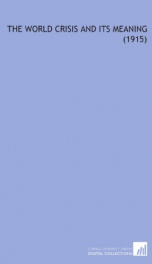
the world crisis and its meaning
Series:
Unknown
Year:
Unknown
Raiting:
2.5/5
Originally published in 1915. This volume from the Cornell University Library's print collections was scanned on an APT BookScan and converted to JPG 2000 format by Kirtas Technologies. All titles scanned cover to cover and pages may include marks notations and other marginalia present in the original volume.
Show more
add to favoritesadd In favorites
Book list

the world crisis and its meaning
Series:
Unknown
Year:
Unknown
Raiting:
2.5/5
Originally published in 1915. This volume from the Cornell University Library's print collections was scanned on an APT BookScan and converted to JPG 2000 format by Kirtas Technologies. All titles scanned cover to cover and pages may include marks notations and other marginalia present in the original volume.
Show more
add to favoritesadd In favorites

the revival of anti semitism
Series:
Unknown
Year:
Unknown
Raiting:
3/5
This volume is produced from digital images created through the University of Michigan University Library's preservation reformatting program. The Library seeks to preserve the intellectual content of items in a manner that facilitates and promotes a variety of uses. The digital reformatting process results in an electronic version of the text that can both be accessed online and used to create new print copies. This book and thousands of others can be found in the digital collections of the University of Michigan Library. The University Library also understands and values the utility of print, and makes reprints available through its Scholarly Publishing Office.
Show more
add to favoritesadd In favorites
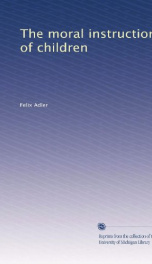
the moral instruction of children
Series:
Unknown
Year:
Unknown
Raiting:
4.5/5
This volume is produced from digital images created through the University of Michigan University Library's large-scale digitization efforts. The Library seeks to preserve the intellectual content of items in a manner that facilitates and promotes a variety of uses. The digital reformatting process results in an electronic version of the original text that can be both accessed online and used to create new print copies. The Library also understands and values the usefulness of print and makes reprints available to the public whenever possible. This book and hundreds of thousands of others can be found in the HathiTrust, an archive of the digitized collections of many great research libraries. For access to the University of Michigan Library's digital collections, please see http://www.lib.umich.edu and for information about the HathiTrust, please visit http://www.hathitrust.org
Show more
add to favoritesadd In favorites
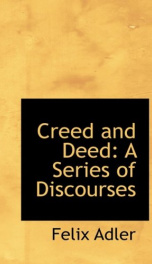
creed and deed a series of discourses
Series:
Unknown
Year:
Unknown
Raiting:
2.5/5
This Elibron Classics book is a facsimile reprint of a 1894 edition by G.P. Putnam's Sons, New York. --This text refers to an alternate Paperback edition.
Show more
add to favoritesadd In favorites
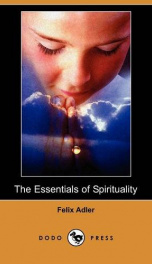
The Essentials of Spirituality
Series:
Unknown
Year:
Unknown
Raiting:
4/5
Felix Adler (1851-1933) was a Jewish rationalist intellectual, popular lecturer, religious leader and social reformer who founded the Ethical Culture movement. He graduated from Columbia University in 1870 and moved to Germany where he received a doctorate from Heidelberg University. Starting in 1874 he spent two years at Cornell University in the Department of History as Professor of Oriental Languages and Hebrew before his "dangerous attitude" caused him to leave. He returned to New York and preached some sermons at the Temple Emanu-El in New York City where his father was still the head rabbi. Then, at the age of twenty-four, Adler founded the New York Society for Ethical Culture in 1876. While the Ethical Culture movement which Adler founded was open to people of diverse beliefs, Adler himself developed and promoted his own vision of an essentially Kantian moral philosophy which prized public work and the use of reason to develop ultimate ethical standards. Adler published such works as Creed and Deed (1878), Moral Instruction of Children (1892), Life and Destiny (1905), The Religion of Duty (1906) and Essentials of Spirituality (1908).
Show more
add to favoritesadd In favorites
What readers are saying
What do you think? Write your own comment on this author!
write a commentif you like Adler Felix try:
readers also enjoyed
What readers are saying
What do you think? Write your own comment on this author!
write a commentGenre
if you like Adler Felix try:
readers also enjoyed
Do you want to read a book that interests you? It’s EASY!
Create an account and send a request for reading to other users on the Webpage of the book!
